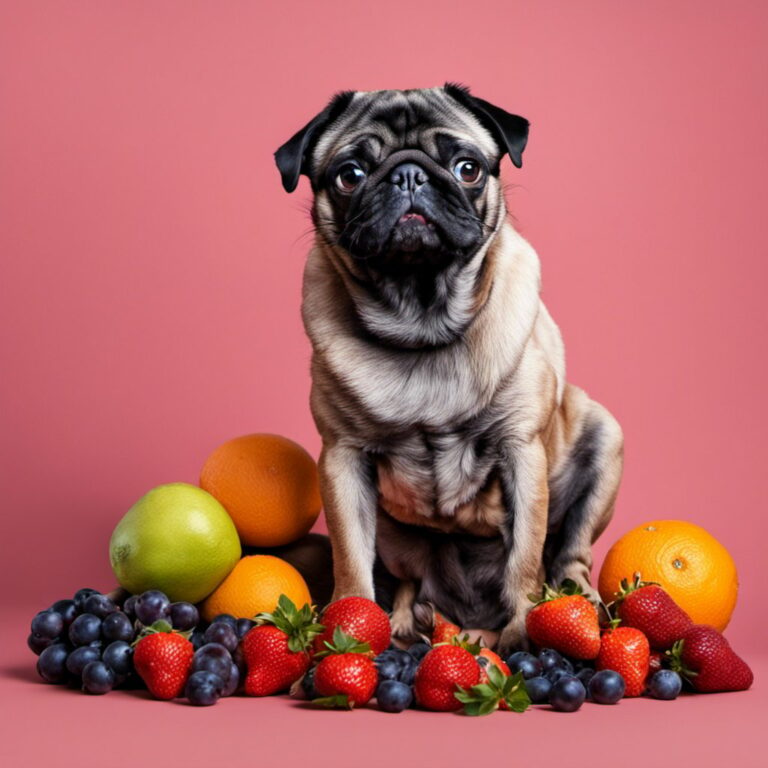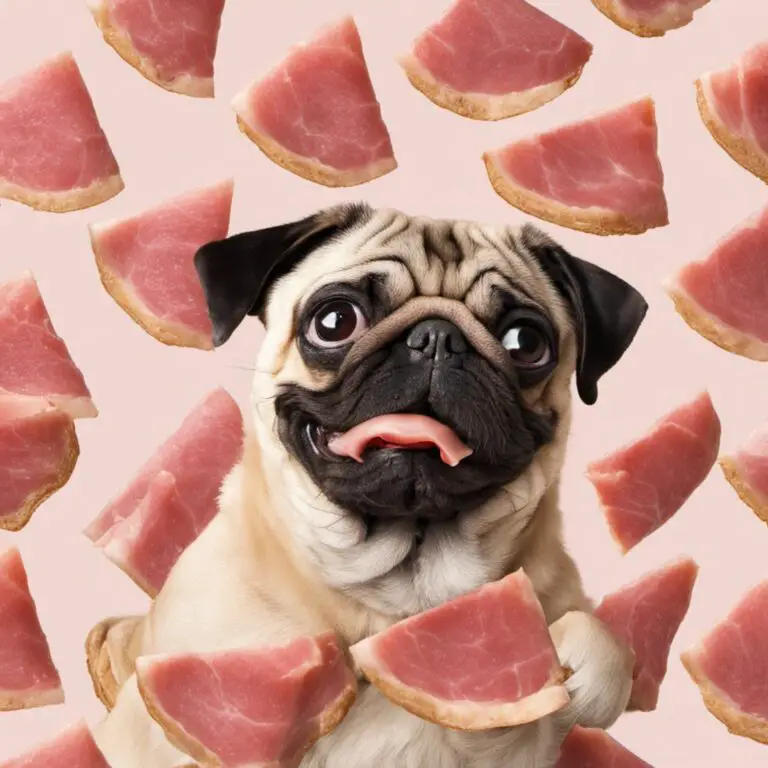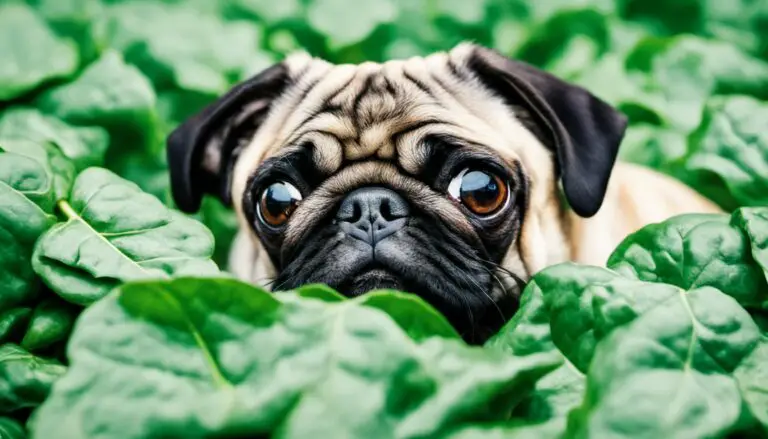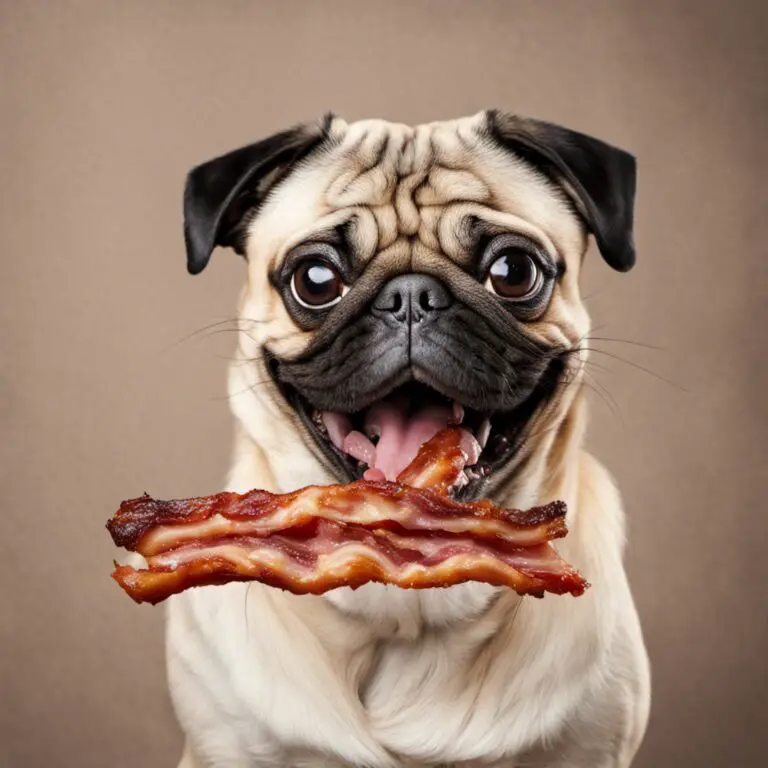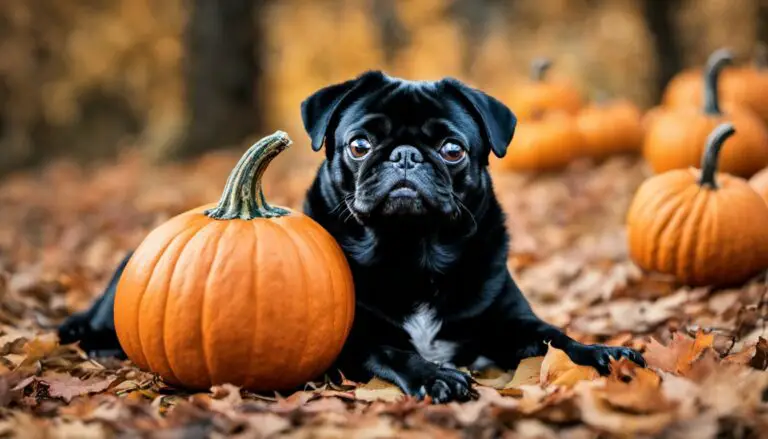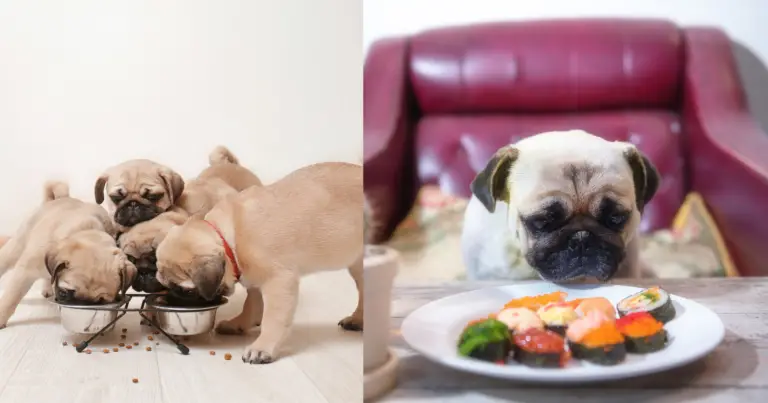Can Pugs Eat Peanuts? A Nutty Debate Unveiled
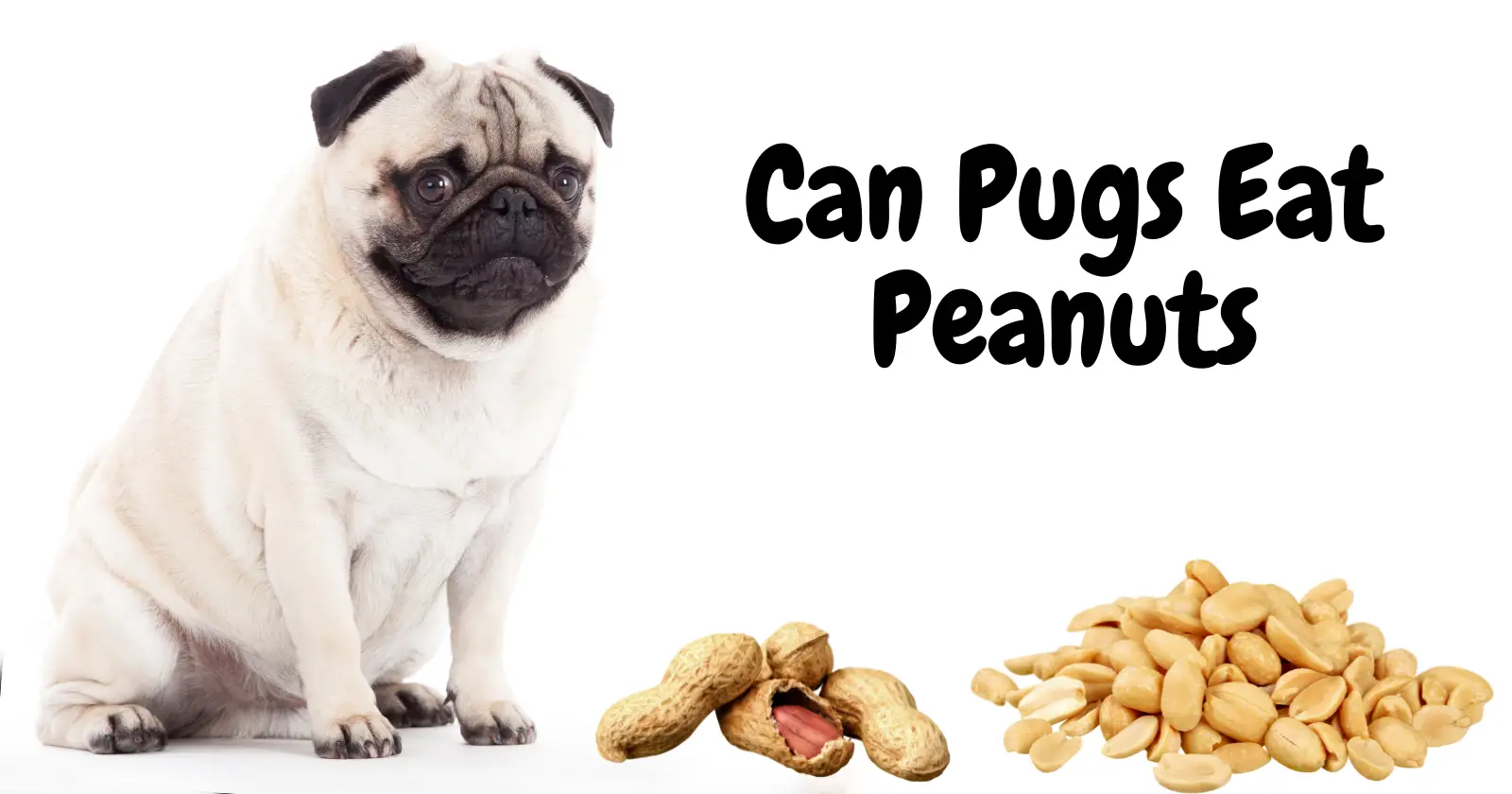
When it comes to feeding your pug, you might wonder if certain human foods are safe for them to consume. One such food that often sparks curiosity among pug owners is peanuts. This article, Can Pugs Eat Peanuts, aims to provide clarity on whether pugs can eat peanuts and what benefits and precautions should be taken into consideration.
Yes, pugs can eat peanuts, as long as they are boiled, roasted, or raw, and have been shelled without salt or other seasonings. However, it is essential to remember that peanuts should not be a regular part of your pug’s diet. Peanuts do provide essential nutrients, such as vitamin B6 and protein, but feeding your pug an excessive amount could lead to potential health issues.
Now that you understand the general safety of peanuts for pugs, it is crucial to be aware of the risks involved and which types of peanuts are best suited for your furry friend. Continue reading to learn more about serving peanuts to your pug and the potential hazards to avoid.
Contents
Table of Contents
Understanding Pugs’ Dietary Needs
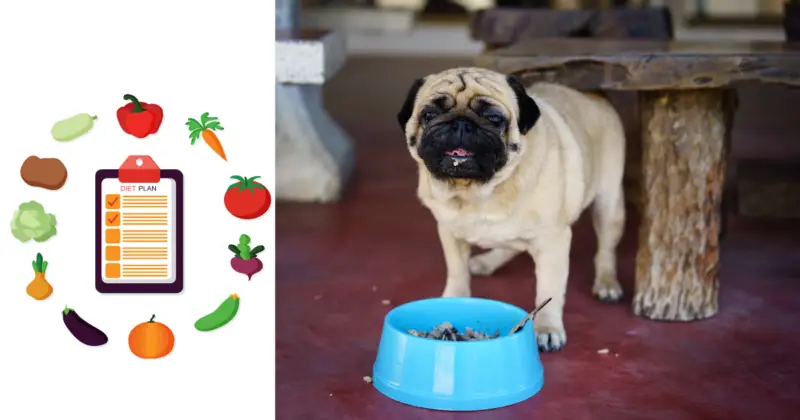
As a pug owner, it’s essential to understand your pug’s dietary needs to ensure their health and happiness. Pugs, like all dogs, are primarily carnivores and require a diet rich in meat. However, they also benefit from the inclusion of vegetables, fruits, and other sources of vital nutrients.
Get The Free Food Eating Guide That Keeps My Pug Happy and Playful Even at 13 Years Old
100% Beginner Friendly & Lists Real Foods Your Pug Can Actually Eat!
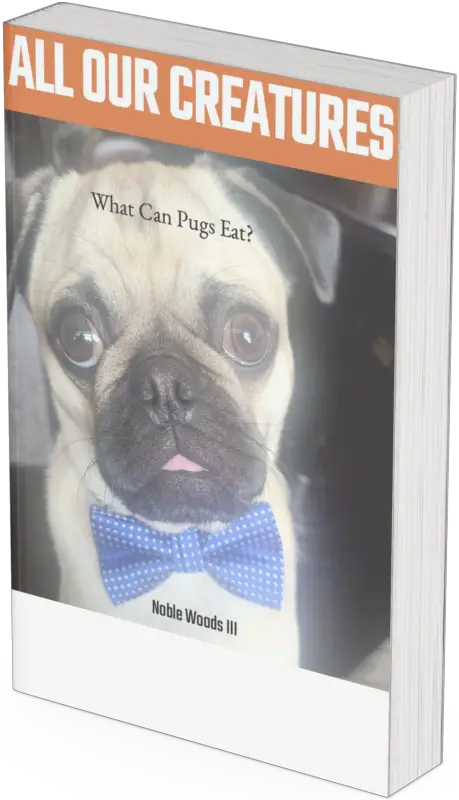
To support their growth and development, pugs need a diet that provides a balance of proteins, vitamins, and minerals. High-quality meat-based protein is crucial for building strong muscles, while a variety of vegetables and fruits can supply necessary antioxidants, vitamins, and minerals.
Keep in mind that pugs are prone to becoming overweight or even obese if they are overfed or consume too many calorie-dense treats. It’s crucial to be mindful when planning meals and portion sizes to avoid these health issues.
One option for providing a balanced diet is to offer a mix of homemade or raw food treats combined with kibble designed for smaller dogs. This combination ensures your pug receives the correct amount of calories, fat, and nutrients, while also protecting their teeth by keeping the kibble size moderate source.
When incorporating fruits and vegetables into your pug’s diet, stick to safe options like cantaloupe, zucchini, and other low-calorie, nutrient-dense choices. Avoid feeding your pug peanuts as their primary snack, but they can occasionally enjoy peanuts that are boiled, roasted, or raw source.
In summary, providing a balanced and nutrient-rich diet for your pug will support their overall health and wellbeing. By understanding their dietary needs and selecting appropriate food sources, you can promote a happy, healthy lifestyle for your furry companion.
Peanuts And Dogs: A General Overview
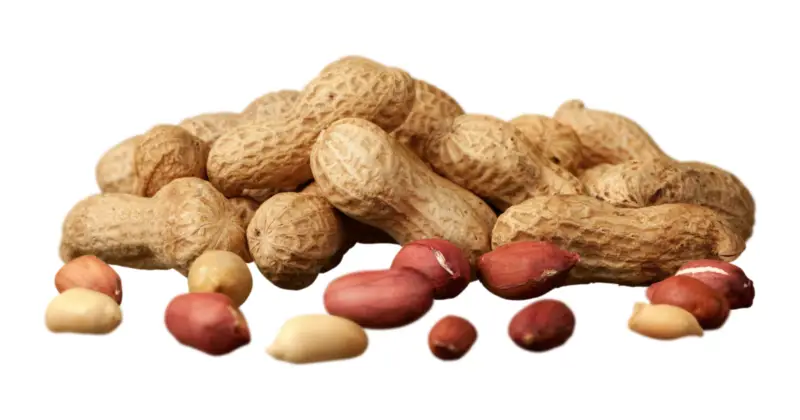
When it comes to your dog’s diet, you might wonder if peanuts are a safe option. In general, peanuts can be a healthy and tasty treat for dogs, including pugs. However, it’s essential to know how to properly prepare and serve peanuts to ensure your pet’s safety.
First, it’s important to note that not all nuts are safe for dogs. Some nuts, like macadamia nuts and walnuts, can be toxic to your furry friends. Stick to peanuts and avoid giving your dog any other type of nut.
When offering peanuts to your dog, make sure they are shelled, as the shells can cause choking hazards. Additionally, it’s best to serve your dog raw or dry roasted peanuts, as these are typically free of any harmful additives. Avoid feeding your dog peanuts that have been seasoned, salted, or coated with chocolate. These additives may contain toxic substances, such as xylitol, which can be harmful to your pet.
Bear in mind that moderation is key when giving peanuts to your dog. Peanuts are high in fat, which can contribute to obesity and other health issues if consumed in excess. Integrate peanuts into your dog’s diet as an occasional snack, rather than a daily treat.
In conclusion, peanuts can be a safe and nutritious treat for your dog when prepared and served properly. Just remember to avoid toxic nuts, select shelled peanuts, and practice moderation to ensure your pet’s safety and overall health.
Potential Health Risks Of Peanuts For Pugs
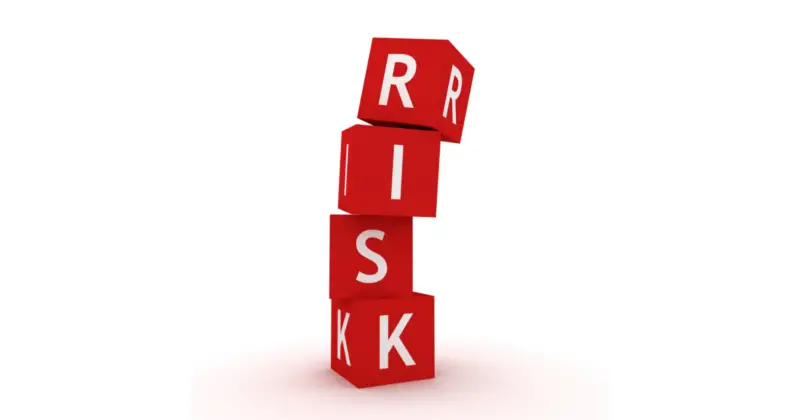
While peanuts can be a safe treat for your pug in moderation, there are potential health risks associated with feeding them peanuts. In this section, we will discuss some of the risks to be aware of when giving your pug peanuts.
Feeding your pug too many peanuts can lead to obesity due to the high calorie and fat content in peanuts. Obesity can then result in other health issues, such as heart disease and pancreatitis. It’s essential to monitor your pug’s diet and exercise routine to prevent these complications.
Choking hazard is another concern while feeding peanuts to your pug. Whole peanuts or large pieces can pose a choking risk to your pet, especially for smaller breeds like pugs. To avoid this risk, make sure to break the peanuts into smaller pieces before giving them to your pug.
Peanuts can also cause digestive upset, such as vomiting and diarrhea, in some pugs. If you notice any changes in your pug’s bowel movements or behavior after feeding them peanuts, it may be a sign that peanuts are not suitable for your pet. In that case, it’s best to discontinue feeding peanuts and consult with your veterinarian.
High levels of sodium in salted peanuts can be harmful to your pug’s health. Consuming excessive sodium may lead to increased thirst and frequent urination, which can potentially harm your pug’s kidneys. Avoid feeding salted peanuts to your pug, and opt for unsalted, plain peanuts instead.
While rare, some pugs may have an allergic reaction to peanuts. This can manifest as skin issues, itching, or digestive problems. If you suspect your pug is experiencing an allergic reaction, contact your veterinarian immediately.
Another factor to consider is xylitol, a sweetener sometimes used in peanut butter. Xylitol is toxic to dogs and can cause severe health issues, including xylitol poisoning, which can be life-threatening. Always check the label of any peanut butter products to ensure they are xylitol-free before sharing them with your pug.
Lastly, whole peanuts can cause intestinal blockage if not chewed properly by your pug. This can lead to severe complications and may result in the need for surgery. Breaking peanuts into smaller pieces can help minimize this risk.
In conclusion, peanuts are generally safe for pugs to consume in moderation as long as they are unsalted and served in small quantities. By being mindful of potential health risks, you can ensure your furry friend enjoys peanuts as a tasty treat without compromising their well-being.
Benefits Of Peanuts For Pugs
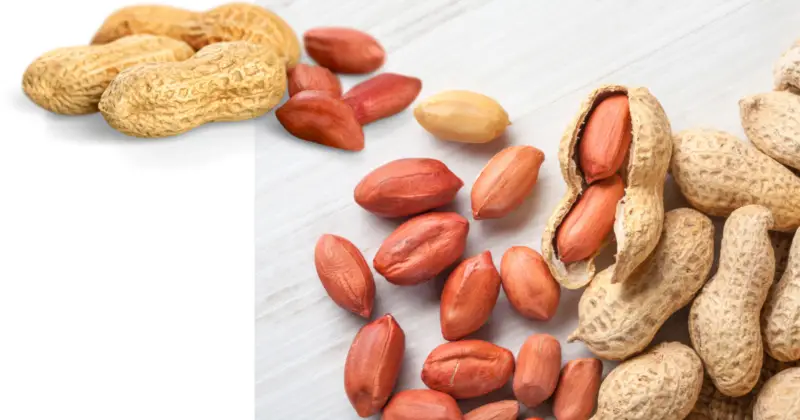
Peanuts can provide several health benefits for your pug when consumed in moderation. First and foremost, peanuts are a good source of protein, which is essential for your pug’s muscle growth and overall health.
Besides protein, peanuts contain healthy fats and fatty acids that help maintain your pug’s skin and coat. These fats also serve as a source of energy, promoting their overall well-being. Additionally, peanuts are a natural source of fiber, promoting healthy digestion in your pug.
Packed with essential vitamins and minerals such as potassium, niacin, vitamin B6, and vitamin E, peanuts contribute to maintaining a strong immune system in your pug. These vitamins and minerals also aid in various metabolic processes, ensuring that your pug stays healthy and active.
The presence of iron in peanuts can help prevent anemia and promote proper red blood cell production in your pug. Additionally, the antioxidants and beta-carotene found in peanuts may provide an added benefit by protecting their cells from oxidative damage, keeping your pug in good health.
Lastly, a small serving of peanuts can be a nutritious snack option for your pug. However, it’s important to remember that moderation is key and to always opt for boiled, roasted, or raw peanuts without any added salt or flavoring. As with any new food, consult with your veterinarian before introducing peanuts into your pug’s diet.
Understanding Peanut Types And Their Effects
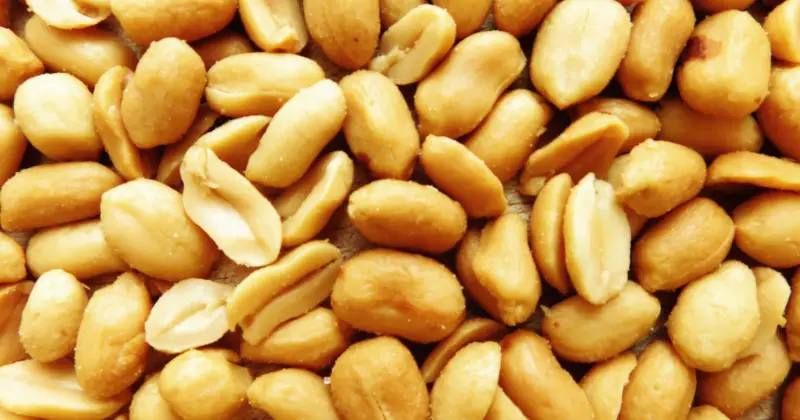
When it comes to feeding your pug peanuts, it’s essential to understand the different types of peanuts and how they can affect your pet. Peanuts can be classified into various categories like raw, boiled, roasted, salted, unsalted, and flavored nuts. Let’s take a closer look at these types and their effects on your pug.
Raw peanuts are safe for your pug to consume in small quantities, as long as they are shelled and free from mold or any contaminants. Be cautious about feeding raw peanuts regularly, though, as they may contain a substance called aflatoxin, which can be harmful to dogs if consumed in large amounts source.
Boiled peanuts are another option you can consider for your pug, as long as they are unsalted. Boiling peanuts softens them, making them easier for your pet to digest. Remember to remove the shells before giving boiled peanuts to your pug.
Roasted peanuts can be a healthy snack for pugs if they are plain and unsalted. Avoid giving your pug salted roasted peanuts, as the high sodium content can lead to health issues like high blood pressure and heart disease in dogs source.
Dry-roasted peanuts are similar to roasted peanuts and are safe for your pug to consume as long as they don’t contain added salt or other harmful seasonings.
It’s crucial to avoid feeding your pug flavored nuts or peanuts with added spices, as these can contain seasonings or coatings that could be toxic to dogs. Offer only plain, unseasoned peanuts to your pug.
Peanut butter can be an excellent treat for your pug, but make sure it’s homemade or a store-bought version without added salt, sugar, and xylitol. Xylitol is an artificial sweetener that is extremely toxic to dogs source. When giving peanut butter to your pug, do so in moderation, as it’s high in fat and should not replace a balanced diet.
Lastly, never give your pug peanuts with the peanut shell still on, as the shells can be a choking hazard and cause digestive issues if ingested. Always remove the shells before offering peanuts to your pet.
By paying attention to the type of peanuts you feed your pug, you can ensure your furry friend enjoys a safe and healthy snack.
Can Pugs Eat Peanuts? Watch this
Feeding Peanuts To Pugs: A Guide
Feeding your pug peanuts can be a safe and enjoyable treat, as long as you take certain precautions. Pugs, like other dogs, can eat peanuts that are boiled, roasted, or raw1. However, it is essential to ensure that the peanuts are plain, shelled, and free of added salt or other seasonings that may be harmful to dogs2.
When offering peanuts as a snack, always practice moderation. It is better to give them as an occasional treat rather than a regular part of your pug’s diet. This is because peanuts are high in fat, which can potentially lead to weight gain and other health issues if consumed excessively.
When it comes to using peanuts as rewards during training, remember to use small amounts. A tiny piece of peanut or a bit of peanut butter can serve as a delicious, motivating incentive for your pug.
As you introduce peanuts into your pug’s diet, pay close attention to their reaction. If they show signs of discomfort, such as vomiting or diarrhea, it might be best to discontinue feeding them peanuts altogether. If you have any concerns or questions, consult your veterinarian to ensure your pug’s health and wellbeing.
In summary, when feeding peanuts to your pug:
- Choose plain, shelled, unsalted peanuts2.
- Give them as an occasional treat, not a regular part of their diet.
- Use small amounts as rewards during training.
- Monitor your pug’s reaction, and consult your veterinarian if you have concerns.
By following this guide and practicing moderation, you can safely give your pug peanuts as a tasty, enjoyable snack.
Alternatives To Peanuts For Pugs
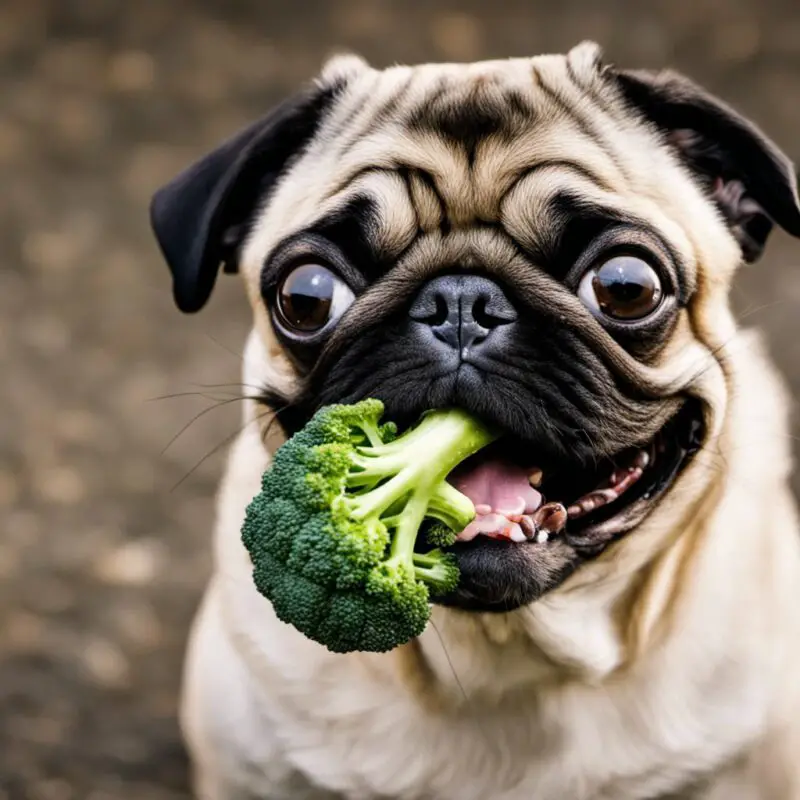
If you’re looking for healthier and safer alternatives to peanuts for your pug, there are several options to consider. It’s essential to introduce new foods gradually and always monitor your pug for any signs of allergies or digestive issues. Here are a few options for alternative snacks for your pug:
Carrots are a great low-calorie option that can help improve dental health in pugs. They are crunchy and packed with vitamins and minerals, making them a perfect treat. You can serve them raw, cooked, or even frozen for hot days.
Broccoli is another nutritious option for pugs, as it contains essential vitamins and fiber. Be sure to serve it cooked and in small quantities, as too much broccoli may cause digestive issues in some dogs.
Sweet potatoes are a fantastic choice for pugs, as they are packed with beneficial nutrients like beta-carotene, vitamin C, and fiber. You can prepare them by boiling or baking and then serve them mashed or cubed. Make sure to remove the skin before feeding it to your pug.
When it comes to fruits, both raspberries and cherries can be a suitable snack for your pug. Raspberries are an excellent source of antioxidants, vitamin C, and fiber, while cherries provide vitamin C and potassium. Be cautious when feeding cherries, though, as the pits contain cyanide and must be removed before giving them to your pug.
Mushrooms can be a safe alternative, provided that they are store-bought and not wild mushrooms. Cooked mushrooms are easier for your pug to digest and can be added to their meals in small amounts.
By offering these alternative snacks to your pug, you can provide them with a variety of healthy and tasty treats. Remember to consult your veterinarian before introducing any new foods to your pug’s diet to ensure they are safe and appropriate for your pet’s specific needs.
Unsafe Foods For Pugs
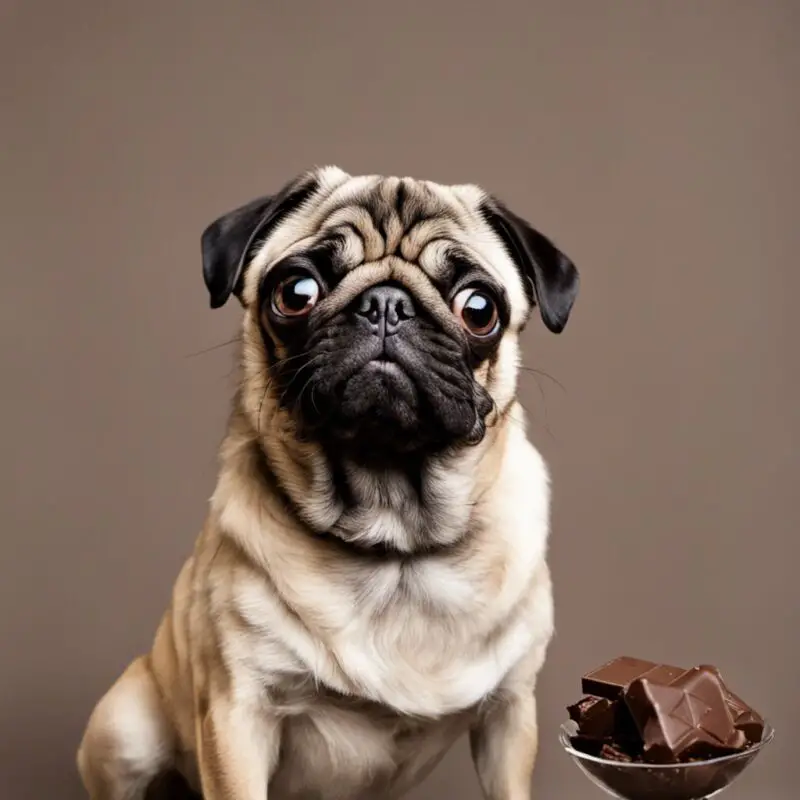
As a pug owner, it’s crucial to be aware of the foods that can be harmful or even toxic to your pet. Some common harmful foods include xylitol, chocolate, onions, garlic, green tomatoes, fat trimmings, avocado, grapes, seeds, and caffeine.
Xylitol is an artificial sweetener used in various sugar-free products. Ingesting xylitol can cause rapid insulin release, leading to hypoglycemia (low blood sugar) in your pug. Symptoms include vomiting, seizures, and even death if not treated immediately.
Chocolate contains theobromine, a substance that is toxic to pugs and other dogs. The darker the chocolate, the higher the concentration of theobromine. Consuming even a small amount of chocolate can lead to vomiting, diarrhea, rapid heart rate, and seizures.
Onions and garlic are harmful to pugs, as they contain compounds that can damage their red blood cells. Ingesting a significant amount may cause anemia, lethargy, and weakness in your pug.
Green tomatoes, along with other members of the nightshade family (such as unripe potatoes), contain a toxin called solanine. Consuming green tomatoes can lead to gastrointestinal issues, confusion, and even seizures in pugs.
Avoid feeding your pug fat trimmings. High-fat foods can lead to pancreatitis, an inflammation of the pancreas, which can be life-threatening.
Avocado is hazardous for pugs, as it contains persin, a toxin that can lead to vomiting, diarrhea, and even heart failure.
Grapes and raisins contain an unknown toxin that can cause kidney failure in dogs. Even a small amount can be fatal, so it is essential to keep them away from your pug.
Seeds, such as those found in apples, cherries, and apricots, contain small amounts of cyanide. While it may not have an immediate effect, it is still essential to prevent your pug from consuming these seeds.
Finally, caffeine found in coffee, tea, and some energy drinks is highly toxic to dogs, including pugs. Ingesting caffeine can lead to hyperactivity, high blood pressure, seizures, and even death.
By being aware of these unsafe foods for your pug, you can ensure their well-being and prevent unnecessary harm to their health.
Consulting With A Veterinarian
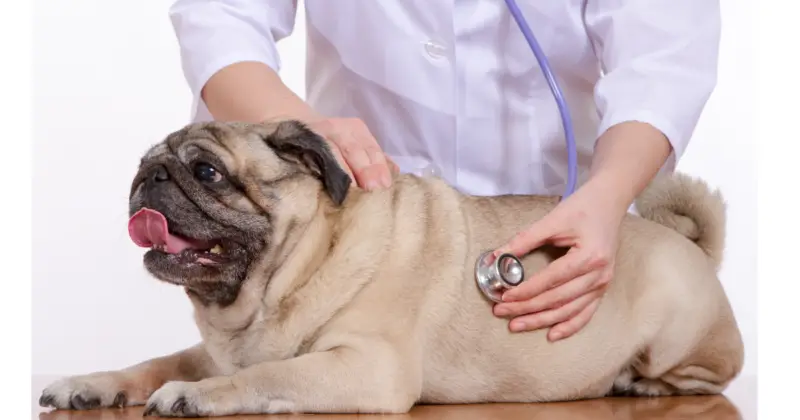
When it comes to your Pug’s diet, it is essential to consult with your veterinarian before adding any new foods. Your veterinarian is a valuable resource in determining the safety and nutritional value of particular foods for your dog.
If you’re considering giving your Pug peanuts, it’s important to discuss this with your veterinarian first. They can provide you with guidance on whether peanuts are appropriate for your Pug, as well as any potential risks or benefits associated with feeding them peanuts.
While certain information found online or from other dog owners may be helpful, your veterinarian is best equipped to give personalized advice based on your Pug’s specific health needs and dietary requirements.
In addition to discussing peanuts, your veterinarian can also recommend other dietary modifications or supplements that may benefit your Pug’s overall health and wellbeing. Keep in mind that every dog is unique, and what works well for one Pug may not be suitable for another.
It’s always better to err on the side of caution when it comes to your furry friend’s health. Relying on the expert advice of your veterinarian will ensure that you are making the best decisions for your Pug’s nutrition and overall wellbeing.
Frequently Asked Questions: Can Pugs Eat Peanuts
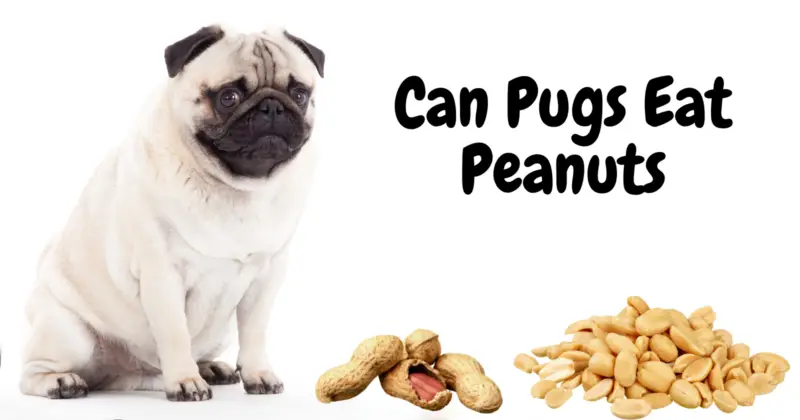
Are peanuts safe for pugs to consume?
Yes, peanuts are generally safe for pugs to consume. They are not toxic and provide health benefits, such as vitamins, protein, and healthy fats. However, it’s essential to introduce peanuts slowly to ensure your pug isn’t allergic and can digest them properly 1.
Can pugs have peanut butter?
Pugs can eat peanut butter as it offers similar benefits to plain peanuts. However, ensure the peanut butter is free of additives, such as xylitol, which can be toxic to dogs. Always choose a natural, unsalted peanut butter and feed it in moderation.
What should I do if my pug eats salted peanuts?
If your pug accidentally consumes salted peanuts, observe them closely for any signs of distress, like excessive thirst, vomiting, or diarrhea, as large amounts of salt can be harmful to dogs. If you notice any concerning symptoms, consult your veterinarian for advice.
Are nuts allowed in a pug’s diet?
While peanuts are safe for pugs to eat, not all nuts are suitable for their diet. Some nuts, like macadamias, can be toxic to dogs [^4^]. It’s essential to research each type of nut before feeding it to your pug and always consult your veterinarian if unsure.
Are peanuts in the shell okay for dogs?
Feeding peanuts in the shell to your pug is not recommended, as the shells can be a choking hazard or cause digestive issues. Instead, provide your pug with shelled peanuts or peanut butter 2.
Can pugs eat honey roasted peanuts?
Pugs should avoid eating honey roasted peanuts. These peanuts have added sugar and may contain other flavorings, which can be unhealthy for your dog. Stick to plain, unsalted peanuts or natural peanut butter for a safer option.

